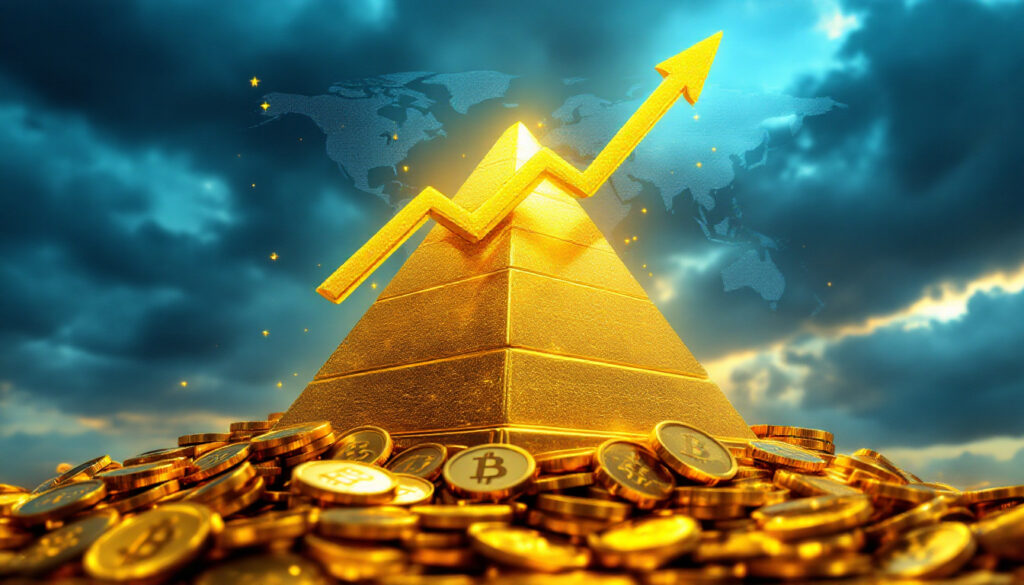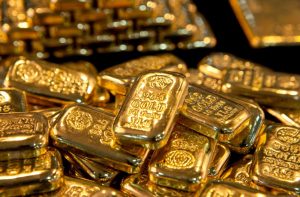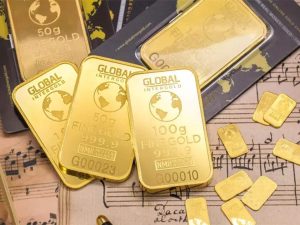global gold price: The economies of the Gulf Cooperation Council (GCC) have long been synonymous with oil. For decades, the black gold flowing from their deserts has built glittering metropolises, funded sovereign wealth, and granted them immense geopolitical influence. However, as the world gradually pivots towards a more diversified energy landscape, another precious metal is poised to play an increasingly critical role in securing their future: gold.
A New Economic Era for the Gulf Cooperation Council: the global gold price
The trajectory of the global gold price in 2025 is not a remote financial metric for these nations; it is a key variable that will significantly impact their economic stability, diversification efforts, and long-term strategic positioning.
Understanding the forces shaping the global gold price is therefore essential to forecasting the economic climate of the Arabian Peninsula.
To project where the global gold price might be headed in 2025, one must first navigate the complex interplay of global macroeconomic forces.
Gold is a unique asset, simultaneously a safe-haven commodity, an inflation hedge, and a currency alternative. Its price is influenced by a cocktail of factors:
-
Monetary Policy and Interest Rates: The most immediate driver is the monetary policy of major central banks, primarily the U.S. Federal Reserve. Gold, which offers no yield, becomes more attractive when interest rates are low. If the Fed and other banks begin to cut rates in 2024/2025 to avoid a recession or stimulate growth, it could provide a strong tailwind for gold, pushing the global gold price higher. Conversely, a persistent hawkish stance could cap its gains.
-
Geopolitical Uncertainty: The world in 2025 is unlikely to be less turbulent than it is today. Ongoing conflicts, trade tensions between major powers, and electoral uncertainties across dozens of nations will fuel demand for safe-haven assets. Every flare-up in tension typically sees investors flocking to gold, driving up its price. This persistent uncertainty is a fundamental bullish factor for the global gold price.
-
Inflation and Recessionary Fears: If inflationary pressures prove stickier than anticipated, investors will seek assets that preserve value. Gold has a centuries-old reputation as a hedge against currency debasement. Conversely, if central bank policies trigger a sharp global recession, the initial sell-off in all assets (including gold) could be followed by a surge as safety becomes paramount.
-
Central Bank Buying: This is perhaps the most crucial trend for the GCC to watch. Central banks, especially from emerging markets (like China, Turkey, and India), have been net buyers of gold for years. They are seeking to diversify their reserves away from the U.S. dollar. This structural demand creates a solid floor for the global gold price and provides consistent upward pressure.
or the Gulf monarchies, this isn’t just an academic exercise
For the Gulf monarchies, this isn’t just an academic exercise. Their relationship with gold is multifaceted, deeply embedded in their culture, and increasingly strategic for their economies.
The most direct impact of a high global gold price is on their national reserves. Most GCC central banks hold significant portions of their foreign exchange reserves in gold.
An appreciating gold price directly boosts the value of these reserves, strengthening their national balance sheets and providing a larger buffer against economic shocks.
This enhances their monetary stability and creditworthiness on the global stage.
Furthermore, several GCC countries are not just holders but also producers. Saudi Arabia, for instance, has ambitious plans under its Vision 2030 to massively expand its gold mining sector, aiming to transform its mining industry into the third pillar of the economy alongside oil and petrochemicals.
A higher global gold price makes these mining projects exponentially more profitable and attractive to foreign investment. It accelerates the development of a non-oil extractive industry, creating jobs, building expertise, and generating a new stream of export revenue.
For Oman and Saudi Arabia, which have substantial mineral resources, a strong gold market is a direct boon to their diversification agendas.
The interplay between oil and gold prices also creates a fascinating dynamic. Historically, there has been a correlation between oil and gold, as both are dollar-denominated commodities.
High oil prices often lead to petrodollar surpluses in the Gulf, which can be reinvested in gold, creating a self-reinforcing cycle.
While this relationship has weakened, a scenario where conflict or supply constraints keep oil prices elevated in 2025 could coincide with the geopolitical uncertainty that also drives gold higher.
This would provide the GCC with a dual windfall: high revenue from oil exports and appreciating value in their gold holdings.
Perhaps the most significant impact of a rising global gold price is on the GCC’s monumental economic diversification plans
Perhaps the most significant impact of a rising global gold price is on the GCC’s monumental economic diversification plans.
Vision 2030 (Saudi Arabia) and similar visions in Qatar, the UAE, and other states are about building post-oil economies. These transformations require staggering amounts of capital.
Sovereign Wealth Funds (SWFs) like Saudi Arabia’s PIF, Abu Dhabi’s ADIA, and Qatar’s QIA are the engines of this change, investing hundreds of billions globally in technology, infrastructure, and other sectors.
The performance of their asset portfolios is paramount. Gold is a standard component of a diversified investment portfolio for any large fund.
A rising global gold price would lead to outsized returns on the gold and gold-related assets (like ETFs or mining company stocks) within their portfolios.
These gains can be reinvested into strategic diversification projects at home and abroad, effectively funding the future with the profits from a timeless asset. It provides a non-oil source of capital growth to fuel the transition away from oil.
The cultural affinity for gold in the Gulf and South Asia also plays a crucial economic role. The GCC, particularly Dubai, is the world’s premier hub for physical gold trade.
A high global gold price increases the value of goods passing through the Dubai Multi Commodities Centre (DMCC) and the iconic Gold Souk.
While it may slightly dampen consumer demand in the jewellery sector, it elevates the value of trade, boosts commissions for refiners and traders, and reinforces Dubai’s status as a critical node in the global gold market. The high value of transactions benefits local businesses, banks, and logistics providers.
the outlook is not without risks
However, the outlook is not without risks. The global gold price is notoriously volatile. A sudden shift towards peace and global cooperation, or a prolonged period of high interest rates, could see gold prices stagnate or fall.
For GCC budgets that might begin to factor in mining revenues, a price crash could create fiscal shortfalls. Furthermore, over-reliance on any single commodity, even gold, runs counter to the core philosophy of diversification.
The goal is to build a resilient economy immune to the swings of commodity markets, not to trade dependence on one commodity for another.
In conclusion, the global gold price in 2025 is set to be a significant determinant of economic fortune for the Gulf Cooperation Council states.
While oil will remain the primary revenue source for the foreseeable future, gold is rapidly ascending as a critical pillar of financial stability, strategic diversification, and future prosperity.
A higher price point strengthens their national reserves, turbocharges their nascent mining industries, provides windfall gains for their sovereign wealth funds, and cements their role as a central hub in the precious metals market.
As the world navigates the uncertainties of 2025, the Gulf nations, with their strategic holdings and proactive policies, are uniquely positioned to turn the timeless allure of gold into a powerful engine for their twenty-first-century transformation.
Their economic future will be written not just in barrels of oil, but also in the enduring gleam of gold.
source: raialkhalij



